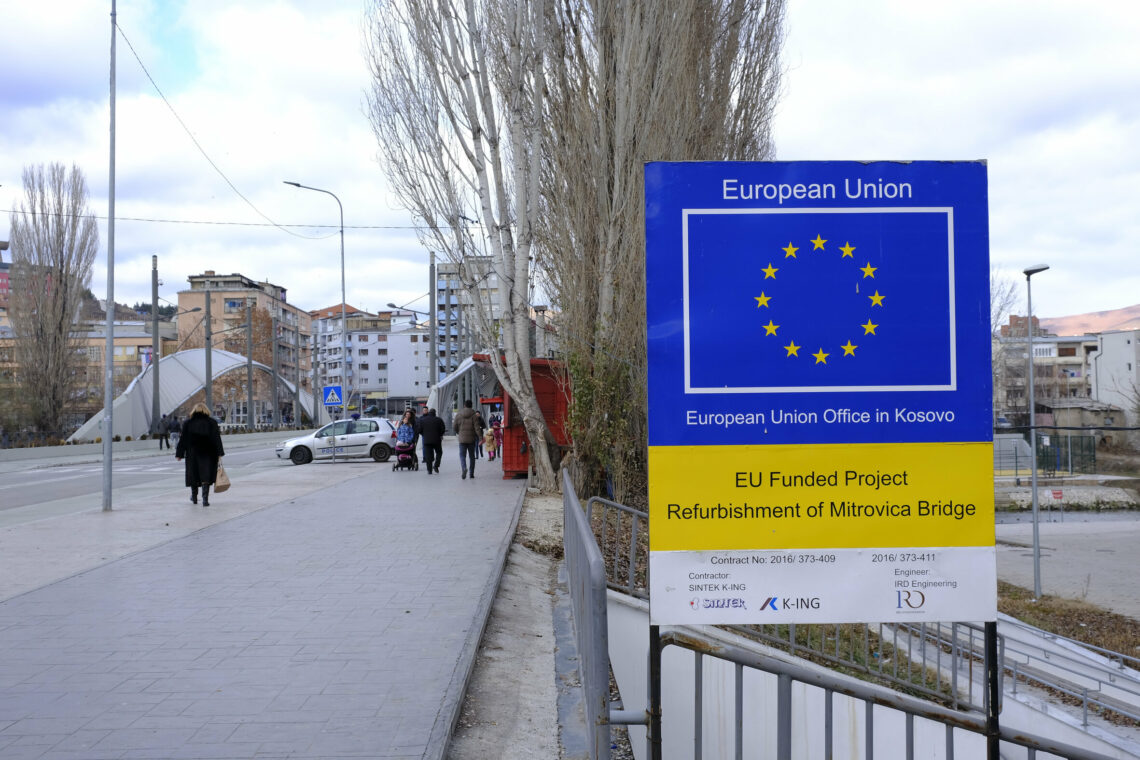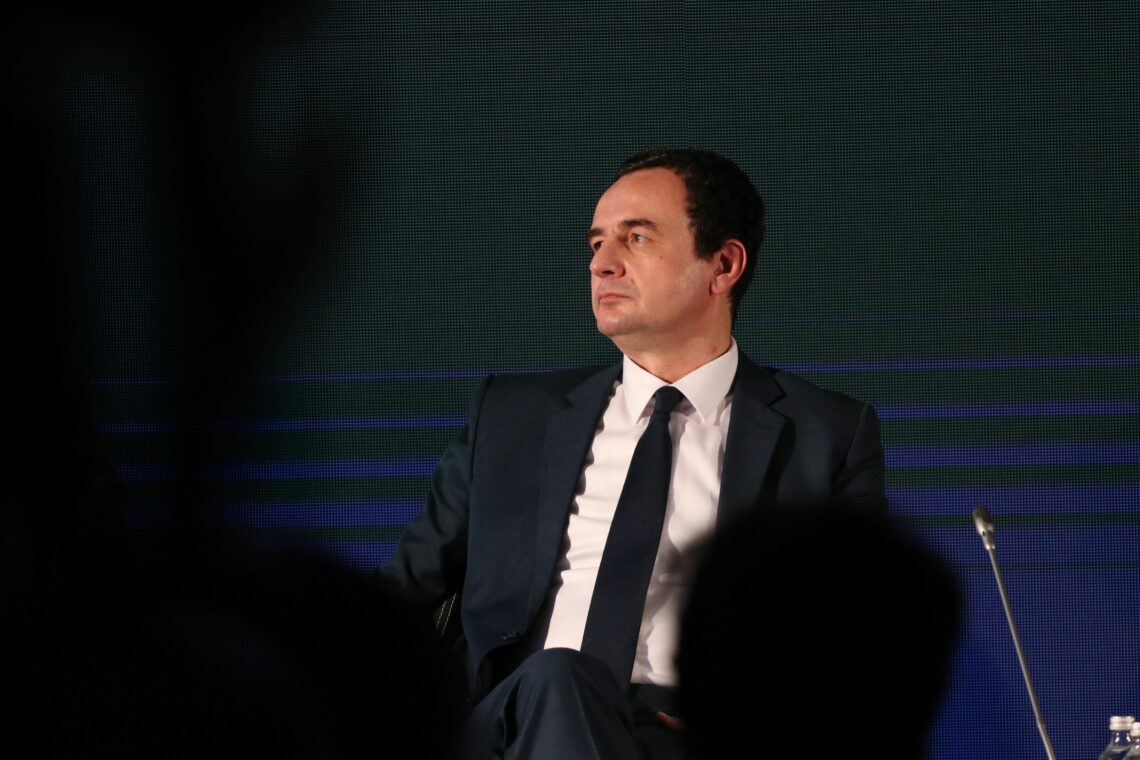Two EU-Balkans challenges
Now that the pandemic has abated and normal political activity has resumed, the transatlantic community is returning to the question of Albania and North Macedonia’s EU accession and the Kosovo-Serbia issue. A resolution appears unlikely in the near future.

In a nutshell
- Recent negotiations have not brought tangible results
- The EU’s willingness to further expand is wavering
- Progress is unlikely short-term due to upcoming elections
After a second Bulgarian veto in the Council of Ministers on June 22, European Union accession negotiations with North Macedonia and Albania were delayed again. The EU-mediated Kosovo-Serbia dialogue relaunched on June 15, but will only continue at the end of July. Both issues will challenge Brussels to define where it stands on enlargement and foreign policy.
By the end of May, the Portuguese EU presidency made a last attempt to unblock North Macedonia’s path to integration. Portugal’s Minister of Foreign Affairs Augusto Santos Silva and EU Commissioner for Neighborhood and Enlargement Oliver Varhelyi visited Sofia and Skopje on May 21. The shuttle diplomacy mission aimed to find a wording of the negotiation framework that would be accepted by both sides before the EU summit. The key point of the Portuguese proposal was to solve disputes between North Macedonia and Bulgaria within the Stabilization and Association Process. But on June 22, Bulgaria announced it would not lift its veto.
France’s EU presidency will begin in the first half of 2022, but Paris is not enthusiastic about letting in new members.
Germany supported the Portuguese compromise, and German Foreign Minister Heiko Maas has recently called for the abolition of individual member state vetoes for foreign policy matters. At a meeting with North Macedonia Prime Minister Zaev in Paris, French President Emmanuel Macron said the country deserves to start accession negotiations.
However, it is unlikely that Bulgaria’s rigid stance will soften before the July 11 elections. President Rumen Radev has said that Sofia has a “long list of conditions for North Macedonia.”
Biden’s blacklist
In parallel to the intensive European shuttle diplomacy over the Macedonian-Bulgarian issue, the transatlantic community attempted to move the Kosovo-Serbia conflict forward. United States Deputy Assistant Secretary of State Matthew Palmer and EU Special Representative for the Pristina-Belgrade Dialogue Miroslav Lajcak visited Pristina on May 31 to prepare a long-awaited first meeting between Kosovo Prime Minister Albin Kurti and Serbian President Aleksandar Vucic.
Ahead of the G7 summit and his first trip to Europe, U.S. President Joe Biden issued an executive order sanctioning a list of Balkan politicians who challenge the territorial integrity established by international agreements that followed the wars of the 1990s and 2000s. On June 15, the Brussels dialogue between Prime Minister Kurti and President Vucic kicked off. Mr. Kurti requested a peace agreement, bilateral reciprocity, mutual recognition and participation in a regional trade agreement. The only point agreed at the meeting was to continue negotiations under EU mediation, starting in late July 2021.
Fewer citizens of member states now support enlargement, with less than half of the EU population in favor of new members.
Both the North Macedonian accession issue and the Serbia-Kosovo negotiations will challenge the EU to better define its enlargement strategy and common foreign policy – two aspects that have been neglected of late. The discussion surrounding the Western Balkans is already tied to a broader debate on the Union’s future.
Forgotten European perspective
After almost two decades of unfulfilled promises from Brussels, it seems unlikely that the enlargement process will accelerate in the next few months. The next countries chairing the EU Council presidency (Slovenia as of July 2021 and the Czech Republic in the second half of 2022) carry less political weight in the Union.
France’s EU presidency will begin in the first half of 2022, but Paris is not enthusiastic about letting in new members. President Macron and Marine Le Pen, the two most serious presidential candidates, will not risk promising accession ahead of the elections. A third possible candidate, former EU commissioner Michel Barnier, wants to focus on strengthening the external Schengen borders and controlling migration to the EU. With German Chancellor Angela Merkel’s approaching departure and the uncertain outcome of the French vote, the main question is not when enlargement will resume but rather whether it will continue at all.
The word “enlargement” is rarely uttered in Brussels these days. More common are alternatives like the “EU-Western Balkans trade zone,” discussed as a substitute for full accession of the region’s six countries. Commissioner Varhelyi has stated that the EU is discussing how to integrate the Western Balkans in some areas of the single market before they could become full members.
Fewer citizens of member states now support enlargement, with less than half of the EU population in favor of new members. In Belgium, France, Germany and the Netherlands, those numbers have dropped to roughly 30 percent. Within the Western Balkans, disappointment with unkept promises has led to growing skepticism. An EU-Western Balkans summit is scheduled during the Slovenian presidency, on October 6, as a follow-up of the 2003 Thessaloniki summit. The Czech Republic is planning to organize a similar meeting while it chairs the EU Council.
Such summits take place regularly, but they will not lead to any substantive action if Brussels does not realize that Balkan countries are the missing piece in a broader geopolitical puzzle. High Representative of the European Union for Foreign Affairs and Security Policy Josep Borrell has repeatedly mentioned that the Western Balkans is a “geopolitical issue,” but this stance has yet to be translated into action.

Russian and Chinese influence
Russia and China are increasingly present in the Western Balkans. On May 14, North Macedonia declared a Russian diplomat persona non grata, a decision that the Russian Ministry of Foreign Affairs qualified as a hostile gesture. Russia also announced it wants to abolish the Office of the High Representative in Bosnia and Herzegovina, whose role is to implement the Dayton peace agreement. It is the only member of the Peace Implementation Council that opposes international presence in Bosnia and Herzegovina.
With a pro-Russian government in Podgorica, it will be difficult for Montenegro to expand its military contingent at the NATO mission in Kosovo, as President Milo Dukanovic informed NATO Secretary General Jens Stoltenberg. According to a GLOBSEC survey, Montenegrins believe that Russia is a more important strategic partner than the U.S. A report of the European Parliament showed that Russia used the Sputnik vaccine as well as disinformation to mobilize Montenegro’s electorate against President Dukanovic’s party. In the 2020 elections, it performed worse than the opposition for the first time in three decades.
The dialogue between Kosovo and Serbia will test Brussels’ capacity to close the last chapter of the Balkan Wars.
Montenegro is also in a dire financial situation because of unpaid credit to China for infrastructure projects. With its debt to China amounting to 27 percent of its gross domestic product (GDP), Serbia could soon fall into the same credit trap – and yet on the streets of Belgrade, posters with the words “Serbs and Chinese, brothers forever” are on display. Experts estimate that if Montenegro does not repay its 640 million euro debt, it could have to cede some of its infrastructure to China.
A delayed peace
The EU-mediated dialogue between Kosovo and Serbia will test Brussels’ capacity to close the last unresolved chapter of the Balkan Wars. One decade of dialogue and 33 agreements later, relations between the two countries have not yet normalized, and there is still no peace agreement 22 years after the end of the war. There is little hope that a resolution will be achieved in the next few months. After the first June meeting between Prime Minister Kurti and President Vucic, the former declared that the talks were not a continuation of the previous Brussels dialogue, but the start of new negotiations.
The EU has no incentive to hurry things along, and it has yet to bring Kosovo into the visa-free Schengen zone. Without strong U.S. involvement, the newest rounds of talks will probably be delayed. At the joint EU-U.S. mission in Pristina and Belgrade to restart the negotiations, Mr. Palmer declared that the final goal should be mutual recognition. Meanwhile, Mr. Lajcak stuck to Brussels’ longtime position and stated that the aim should be full normalization of relations between Kosovo and Serbia.
During the same time period, Serbian Parliament President Ivica Dacic visited Moscow and met the Russian Foreign Minister Sergei Lavrov, who reconfirmed that the Kremlin will support “the solution accepted by Belgrade.” American involvement in this dialogue would help balance out the bias against Pristina, since two key EU mediators of the dialogue (Mr. Borell and Mr. Lajcak) come from member states that do not recognize Kosovo. Kosovo Prime Minister Albin Kurti has declared that these talks “will not be negotiations over Kosovo’s status.”
Serbia is purchasing drones and other weapons from China, despite the EU embargo and a warning from Washington.
A final agreement between Kosovo and Serbia would require a Schuman-style forgiveness of past crimes like the postwar reconciliation between France and Germany, which paved the way for integration. Unfortunately, Serbia lacks any politician in the mold of Germany’s Konrad Adenauer or Willy Brandt. Serbian President Vucic appears to be betting on conflict rather than appeasement. He recently claimed that NATO/KFOR (Kosovo Force) was likely to withdraw from Kosovo, according to intelligence from “one important NATO member.” But that speculation was promptly denied by NATO Secretary General Stoltenberg during his meeting with the Serbian President in Brussels on May 17. He emphasized that the consensus of all 30 member states is necessary for that decision.
It is unlikely that NATO/KFOR would withdraw before relations with Serbia are normalized. German Minister for Europe Michael Roth requested that German troops remain in KFOR because “even after 22 years of the war the region is far from reconciliation and peace.” Serbia is also continuing to militarize, allocating 2 billion euros annually to its defense budget. Belgrade purchased military aircraft from Russia in 2020 and 30 Russian tanks were delivered on May 23 of this year. The Vucic government is also purchasing drones and other weapons from China, despite the EU embargo on such purchases and a warning from Washington. Serbia and Russia held a joint military exercise in 2021. Such developments bode ill for regional peace.
Scenarios
In a first pessimistic scenario, given Bulgaria’s caretaker government and early elections on July 11, accession negotiations for North Macedonia and Albania appear unlikely before December of this year. It is also improbable that the restart of the Kosovo-Serbia dialogue will produce a quick move toward a final agreement. Kosovo will hold local elections in October, and Serbians will choose a president next spring. Neither government will want to risk a compromise agreement that would weaken its electoral position.
A second and moderately optimistic scenario would see Bulgaria reconsider its rigid opposition to the start of accession negotiations for North Macedonia, most likely during the Slovenian EU presidency. The Brussels dialogue between Pristina and Belgrade could bring some results in the months ahead, but it is less likely that a final agreement would be reached before mid-2022, after the closing of elections cycles in both countries. Ahead of parliamentary elections in the fall, Kosovo Prime Minister Kurti will most likely want to delay a hard decision. Similarly, Serbian President Vucic will not want to take risks in the last year of his first presidential mandate, ahead of a possible reelection.








